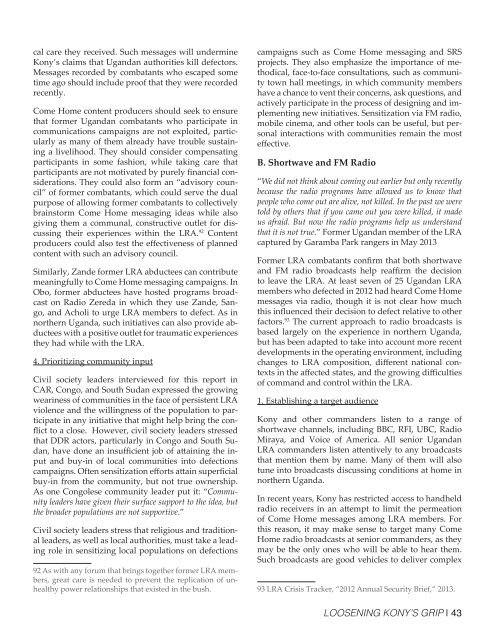Loosening-Konys-Grip-July-2013-FINAL
Loosening-Konys-Grip-July-2013-FINAL
Loosening-Konys-Grip-July-2013-FINAL
You also want an ePaper? Increase the reach of your titles
YUMPU automatically turns print PDFs into web optimized ePapers that Google loves.
cal care they received. Such messages will undermineKony’s claims that Ugandan authorities kill defectors.Messages recorded by combatants who escaped sometime ago should include proof that they were recordedrecently.Come Home content producers should seek to ensurethat former Ugandan combatants who participate incommunications campaigns are not exploited, particularlyas many of them already have trouble sustaininga livelihood. They should consider compensatingparticipants in some fashion, while taking care thatparticipants are not motivated by purely financial considerations.They could also form an “advisory council”of former combatants, which could serve the dualpurpose of allowing former combatants to collectivelybrainstorm Come Home messaging ideas while alsogiving them a communal, constructive outlet for discussingtheir experiences within the LRA. 92 Contentproducers could also test the effectiveness of plannedcontent with such an advisory council.Similarly, Zande former LRA abductees can contributemeaningfully to Come Home messaging campaigns. InObo, former abductees have hosted programs broadcaston Radio Zereda in which they use Zande, Sango,and Acholi to urge LRA members to defect. As innorthern Uganda, such initiatives can also provide abducteeswith a positive outlet for traumatic experiencesthey had while with the LRA.4. Prioritizing community inputCivil society leaders interviewed for this report inCAR, Congo, and South Sudan expressed the growingweariness of communities in the face of persistent LRAviolence and the willingness of the population to participatein any initiative that might help bring the conflictto a close. However, civil society leaders stressedthat DDR actors, particularly in Congo and South Sudan,have done an insufficient job of attaining the inputand buy-in of local communities into defectionscampaigns. Often sensitization efforts attain superficialbuy-in from the community, but not true ownership.As one Congolese community leader put it: “Communityleaders have given their surface support to the idea, butthe broader populations are not supportive.”Civil society leaders stress that religious and traditionalleaders, as well as local authorities, must take a leadingrole in sensitizing local populations on defections92 As with any forum that brings together former LRA members,great care is needed to prevent the replication of unhealthypower relationships that existed in the bush.campaigns such as Come Home messaging and SRSprojects. They also emphasize the importance of methodical,face-to-face consultations, such as communitytown hall meetings, in which community membershave a chance to vent their concerns, ask questions, andactively participate in the process of designing and implementingnew initiatives. Sensitization via FM radio,mobile cinema, and other tools can be useful, but personalinteractions with communities remain the mosteffective.B. Shortwave and FM Radio“We did not think about coming out earlier but only recentlybecause the radio programs have allowed us to know thatpeople who come out are alive, not killed. In the past we weretold by others that if you came out you were killed, it madeus afraid. But now the radio programs help us understandthat it is not true.” Former Ugandan member of the LRAcaptured by Garamba Park rangers in May <strong>2013</strong>Former LRA combatants confirm that both shortwaveand FM radio broadcasts help reaffirm the decisionto leave the LRA. At least seven of 25 Ugandan LRAmembers who defected in 2012 had heard Come Homemessages via radio, though it is not clear how muchthis influenced their decision to defect relative to otherfactors. 93 The current approach to radio broadcasts isbased largely on the experience in northern Uganda,but has been adapted to take into account more recentdevelopments in the operating environment, includingchanges to LRA composition, different national contextsin the affected states, and the growing difficultiesof command and control within the LRA.1. Establishing a target audienceKony and other commanders listen to a range ofshortwave channels, including BBC, RFI, UBC, RadioMiraya, and Voice of America. All senior UgandanLRA commanders listen attentively to any broadcaststhat mention them by name. Many of them will alsotune into broadcasts discussing conditions at home innorthern Uganda.In recent years, Kony has restricted access to handheldradio receivers in an attempt to limit the permeationof Come Home messages among LRA members. Forthis reason, it may make sense to target many ComeHome radio broadcasts at senior commanders, as theymay be the only ones who will be able to hear them.Such broadcasts are good vehicles to deliver complex93 LRA Crisis Tracker, “2012 Annual Security Brief,” <strong>2013</strong>.LOOSENING KONY’S GRIP | 43


